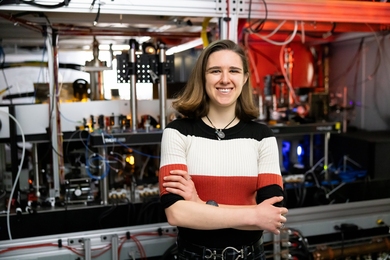The Massachusetts Institute of Technology faculty yesterday approved a new course of study for undergraduates, in biological engineering, the first entirely new curriculum established at the Institute in 29 years.
MIT is the first university in the nation to take the step of fusing molecular and cellular bioscience with engineering to create a new biological engineering discipline. Many other universities and medical schools offer biomedical engineering (or bioengineering) programs aimed at applying engineering to medicine, and there are biological engineering programs that have an entirely different focus--generally mainly on agriculture. But an engineering discipline grounded in molecular and cellular biology, enabling a broad spectrum of applications, including but not focused on medicine, has not been established before now. Other universities are expected to be influenced by MIT's approach.
"MIT's program is pioneering the premise of doing engineering analysis, design and synthesis based in modern molecular life sciences with the aim of impacting a diverse set of application areas and industries ranging from microelectronic materials to ocean ecology," said Linda Griffith, professor of mechanical and biological engineering and chair of the biological engineering undergraduate program committee at MIT.
The MIT program is different because the engineering will be taught from the beginning entirely in the context of biology, rather than in the context of machines or chemistry or materials. By contrast, the curricula in biomedical engineering programs typically have students take their engineering courses in various other engineering departments, then learn to apply engineering to medicine and physiology.
Nine new subjects at MIT have been developed for the course of biological engineering, in addition to advanced subjects in math, chemistry and biology. Core subjects include Thermodynamics of Biomolecular Systems; Fields, Forces and Flows of Biological Systems; Molecular, Cell and Tissue Biomechanics; Biomolecular Kinetics and Cell Dynamics; and two laboratory subjects in biotechnology and biological instrumentation. The math and science core will include organic chemistry, genetics, cell biology, biochemistry and differential equations.
MIT Provost Robert Brown described the establishment of the new program as "a tremendously important step in the development of the academic interface between biology, health science and engineering. It is wonderful to see MIT's leadership on this important frontier propelled by such a wonderful group of faculty colleagues."
The last new course of study established at MIT before today was Linguistics and Philosophy in 1976. Since then, other departments have added different "flavors" to their undergraduate degree programs. For instance, the Department of Mathematics now offers a bachelor of science in mathematics with an emphasis on computer science. A number of new graduate programs have been developed, most notably the Computational Systems and Biology program that started in 2004. But yesterday's faculty vote in favor of the new biological engineering course is the first new course of study in 29 years.
A version of this article appeared in MIT Tech Talk on March 2, 2005 (download PDF).





